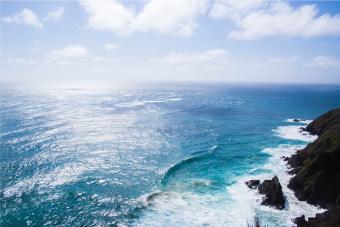NOC scientists have contributed to a major new publication by the UK Marine Climate Change Impacts Partnership (MCCIP), which demonstrates the effects climate change is having on UK seas and coastlines.
In 2006, a partnership of UK scientists, government, its agencies and non-governmental organisations established the MCCIP group to bring together expertise across marine and climate science. In their first report card, published in November 2006, MCCIP identified a range of impacts on the marine environment linked to climate change, and considered potential future effects. These included warming seas, changes in the distribution of marine species and increased risks of coastal flooding.
Ten years on, this report builds on contributions from 400 scientists, including those from the NOC who contributed expertise on one of the world’s largest system of currents – the Atlantic Meridional Ocean Circulation, or AMOC.
Dr Gerard McCarthy from the NOC, who contributed to the report, said “ocean currents transport large amounts of heat and energy across the planet, and so have a significant impact on the weather and climate. The NOC’s sustained observation of the AMOC over a decade has enabled us to contribute valuable information on the impact of changing ocean circulation in the Atlantic, which could arguably impact the British Isles more than anywhere else.”
The reports key findings are:
- Despite year-to-year fluctuations in temperature over the past decade, a long-term underlying warming trend is still clear. Some of this variability can be accounted for through short-term changes in the strength of Atlantic Ocean circulation, which has been linked to recent severe winters in the UK.
- Climate change is clearly affecting marine species and habitats, but not necessarily in the ways anticipated 10 years ago. Some warm-water marine species such as squid and anchovies targeted by fishers have become more common place in UK waters, with clear links to climate change, while for non-native species, other factors (e.g. ballast water, ship hulls) have been more important for their establishment.
- Seabirds in the UK face an uncertain future due to climate change, with the productivity of some species such as fulmars, Atlantic puffins, little and Arctic terns and black legged kittiwakes being impacted by temperature rise, while severe storms are affecting breeding success of razorbills.
- Ocean acidification has become established as a major issue for marine ecosystems, and may be taking place at a faster rate in UK seas than in the wider north Atlantic. Overall the impacts are expected to be negative, most notably for shellfish growth and harvest in future decades.
- Extreme high-water events are becoming more frequent at the coast due to sea- level rise. However, this has not led to a corresponding increase in coastal flooding to date due to continued improvements in flood defences, emergency planning, forecasting and warning.
This report highlights the critical importance of independent, robust evidence gathering and the provision of clear messages when communicating climate change science to decision makers and the public. In particular, the partnership emphasises that recent short term variations need to be clearly placed in the context of longer term, human driven, climate warming.
Sir David Attenborough, says of the report: “Concern about the state of our seas has caused them to be studied more intensively – and extensively – than ever before. Here is a summary of the findings. They have never been more important”.
Dr Matt Frost, chair of the MCCIP working group that delivered this report said “Since 2006 we have been working with the marine scientific community to provide timely, independent, non-biased information to policy-makers. As often happens in science, we have learned that things are more complicated than first thought but in general, earlier predictions on climate impacts on the marine environment have been borne out.
What has also been exciting with this project has been being involved in the development and evolution of a robust mechanism for communicating science to policy-makers that has now been taken up as a model for use in other countries and for other elements of science to policy reporting”.

